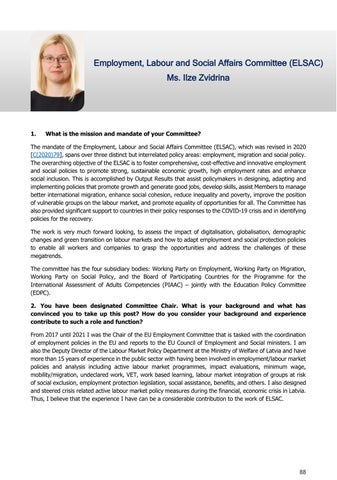Employment, Labour and Social Affairs Committee (ELSAC) Ms. Ilze Zvidrina
1.
What is the mission and mandate of your Committee?
The mandate of the Employment, Labour and Social Affairs Committee (ELSAC), which was revised in 2020 [C(2020)79], spans over three distinct but interrelated policy areas: employment, migration and social policy. The overarching objective of the ELSAC is to foster comprehensive, cost-effective and innovative employment and social policies to promote strong, sustainable economic growth, high employment rates and enhance social inclusion. This is accomplished by Output Results that assist policymakers in designing, adapting and implementing policies that promote growth and generate good jobs, develop skills, assist Members to manage better international migration, enhance social cohesion, reduce inequality and poverty, improve the position of vulnerable groups on the labour market, and promote equality of opportunities for all. The Committee has also provided significant support to countries in their policy responses to the COVID-19 crisis and in identifying policies for the recovery. The work is very much forward looking, to assess the impact of digitalisation, globalisation, demographic changes and green transition on labour markets and how to adapt employment and social protection policies to enable all workers and companies to grasp the opportunities and address the challenges of these megatrends. The committee has the four subsidiary bodies: Working Party on Employment, Working Party on Migration, Working Party on Social Policy, and the Board of Participating Countries for the Programme for the International Assessment of Adults Competencies (PIAAC) – jointly with the Education Policy Committee (EDPC). 2. You have been designated Committee Chair. What is your background and what has convinced you to take up this post? How do you consider your background and experience contribute to such a role and function? From 2017 until 2021 I was the Chair of the EU Employment Committee that is tasked with the coordination of employment policies in the EU and reports to the EU Council of Employment and Social ministers. I am also the Deputy Director of the Labour Market Policy Department at the Ministry of Welfare of Latvia and have more than 15 years of experience in the public sector with having been involved in employment/labour market policies and analysis including active labour market programmes, impact evaluations, minimum wage, mobility/migration, undeclared work, VET, work based learning, labour market integration of groups at risk of social exclusion, employment protection legislation, social assistance, benefits, and others. I also designed and steered crisis related active labour market policy measures during the financial, economic crisis in Latvia. Thus, I believe that the experience I have can be a considerable contribution to the work of ELSAC.
88
















